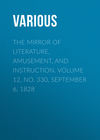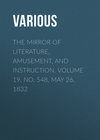Читать книгу: «The Mirror of Literature, Amusement, and Instruction. Volume 12, No. 330, September 6, 1828», страница 6
THE BLIND BEAUTY OF THE MOOR
(A Fragment.)
To thee—O palest phantom—clothed in white raiment, not like unto a ghost risen with its grave-clothes to appal, but like a seraph descending from the skies to bless—unto thee will we dare to speak, as through the mist of years back comes thy yet unfaded beauty, charming us, while we cannot choose but weep, with the self-same vision that often glided before us long, long ago in the wilderness, and at the sound of our voice would pause for a little while, and then pass by, like a white bird from the sea, floating unscared close by the shepherd's head, or alighting to trim its plumes on a knoll far up an inland glen! Death seems not to have touched that face, pale though it be—life-like is the waving of those gentle hands—and the soft, sweet, low music which now we hear, steals not sure from lips hushed by the burial-mould! Restored by the power of love, she stands before us as she stood of yore. Not one of all the hairs of her golden head was singed by the lightning that shivered the tree under which the child had run for shelter from the flashing sky. But in a moment the blue light in her dewy eyes was dimmed—and never again did she behold either flower or star. Yet all the images of all the things she had loved remained in her memory, clear and distinct as the things themselves before unextinguished eyes—and ere three summers had flown over head, which, like the blossom of some fair perennial flower, in heaven's gracious dew and sunshine each season lifted its loveliness higher and higher in the light—she could trip her singing way through the wide wilderness, all by her joyful self, led, as all believed, nor erred they in so believing, by an angel's hand! When the primroses peeped through the reviving grass upon the vernal braes, they seemed to give themselves into her hand; and 'twas thought they hung longer unfaded round her neck or forehead than if they had been left to drink the dew on their native bed. The linnets ceased not their lays, though her garment touched the broomstalk on which they sung. The cushat, as she thrid her way through the wood, continued to croon in her darksome tree—and the lark, although just dropped from the cloud, was cheered by her presence into a new passion of song, and mounted over her head, as if it were his first matin hymn. All the creatures of earth and air manifestly loved the Wanderer of the Wilderness—and as for human beings, she was named, in their pity, their wonder, and their delight, the Blind Beauty of the Moor!
She was an only child, and her mother had died in giving her birth. And now her father, stricken by one of the many cruel diseases that shorten the lives of shepherds on the hills, was bed-ridden—and he was poor. Of all words ever syllabled by human lips, the most blessed is—Charity. No manna now in the wilderness is rained from heaven—for the mouths of the hungry need it not in this our Christian land. A few goats feeding among the rocks gave them milk, and there was bread for them in each neighbour's house—neighbour though miles afar—as the sacred duty came round—and the unrepining poor sent the grateful child away with their prayers.
One evening, returning to the hut with her usual song, she danced up to her father's face on his rushy bed, and it was cold in death. If she shrieked—if she fainted—there was but one ear that heard, one eye that saw her in her swoon. Not now floating light like a small moving cloud unwilling to leave the flowery braes, though it be to melt in heaven, but driven along like a shroud of flying mist before the tempest, she came upon us in the midst of that dreary moss; and at the sound of our quaking voice, fell down with clasped hands at our feet—"My father's dead!" Had the hut put already on the strange, dim, desolate look of mortality? For people came walking fast down the braes, and in a little while there was a group round us, and we bore her back again to her dwelling in our arms. As for us, we had been on our way to bid the fair creature and her father farewell. How could she have lived—an utter orphan—in such a world! The holy power that is in Innocence would for ever have remained with her; but Innocence longs to be away, when her sister Joy has departed; and 'tis sorrowful to see the one on earth, when the other has gone to heaven! This sorrow none of us had long to see; for though a flower, when withered at the root, and doomed ere eve to perish, may yet look to the careless eye the same as when it blossomed in its pride,—its leaves, still green, are not as once they were,—its bloom, though fair, is faded—and at set of sun, the dews shall find it in decay, and fall unfelt on all its petals. Ere Sabbath came, the orphan child was dead. Methinks we see now her little funeral. Her birth had been the humblest of the humble; and though all in life had loved her, it was thought best that none should be asked to the funeral of her and her father, but two or three friends; the old clergyman himself walked at the head of the father's coffin—we at the head of the daughter's—for this was granted unto our exceeding love;—and thus passed away for ever the Blind Beauty of the Moor!—Ibid.
THE GATHERER
A snapper up of unconsidered trifles,
SHAKSPEARE.
EPICURISM
(For the Mirror.)
At a public dinner, Captain R. commencing a conversation with a gentleman next to him, was astonished at not being able to elicit one word in answer. At length his silent neighbour turned to him, and said, with a look and tone suitable to the importance of the communication, "Sir, whenever you are at a venison feast, let me advise you never to speak during dinner. In endeavouring to reply to you, I have actually at this moment swallowed entire a fine piece of fat, without tasting it!"
J.G.R.
An Englishman, named Drinkwater, was nearly drowned the other day off Boulogne; on hearing which, a wag observed that he had "almost taken a drop too much."
FLY WATER
Prussic Acid has been obtained from the leaves of green tea, in so concentrated a state, that one drop killed a dog almost instantaneously. A strong infusion of Souchong tea, sweetened with sugar, is as effectual in poisoning flies as the solution of arsenic, generally sold for that purpose.
There may now be seen, written on a board on a new house in the Blackfriars-road, the following words:—"Hird robeish may be had heare."
BILLY.
NO JOKE OR RIDDLE
A house with wings extended wide,
A racket-ground to play in,
Two porters' lodges there beside,
And porters always staying
To guard the inmates there within,
And keep them from the town;
From duns as free as saints from sin,
And sheriffs of renown.
To get white wash'd it is their plan,
'Tis such a cleansing thing—
Then out they come with blacker hands
Than when they first went in.
P.H.H.
The following lines are copied from a seat in Greenwich Park, written in chalk; and from their style, they may be supposed to have been written by one who meditated suicide:—
Oh! deaf to nature and to heav'n's command,
Against thyself to lift the murd'ring hand,
Oh! damn'd despair to shun the living light,
And plunge thy guilty soul to endless night.
Written also in the same hand:—Charlotte Rumpling, you did not use me well, but I forgive you—God bless you.
EDWIN W–.
WANTS A WIFE
She must bee middel eaged and good tempered widdow, or a Maid, and pursest of propertey, and I wood far reather have a Wife that is ever so plain then a fine Lady that think herself hansom; the Advertiser is not rich nor young, old nor poor, and in a very few years he will have a good incumb. Can be hiley reckamended for onestey, sobrieaty, and good temperd, and has no in combranc, is very actif, but not a treadesman, have been as Butler and Bailiff for meney years in most respectable families, and shood I not be so luckey as to get me a wife, wood be most willing to take a sitteyeashan once moor, wood prefer living in the countrey, under stands Brewing feamosley, is well adapted for a inn or publick hous. Please to derect W.W., 268, Berwick-street, Oxford-roade, or aney Ladey may call and have a interview with the widdow that keeps the hous, and say wher and when we can meet each other. All letters must be pd, no Ofice-keeper to applygh. My fameley ar verey well off and welthey, far above the midling order.
This is a good joke upon Matrimonial Advertising.
Jack Bannister visited the Haymarket theatre on Wednesday night, August 20, and made in the free-list book the following entry:—"Fifty years ago, in the year 1778, I made my first appearance at this theatre. Half a century is not bad. Hurra!! John Bannister."
ALPHABETICAL AGREEMENT
In reading over an agreement, for letting a house, the other day, the initials of the party letting it were A.B., of the party taking C.D., and of the witness to the signatures E.F.
Покупайте книги и получайте бонусы в Литрес, Читай-городе и Буквоеде.
Участвовать в бонусной программе




















